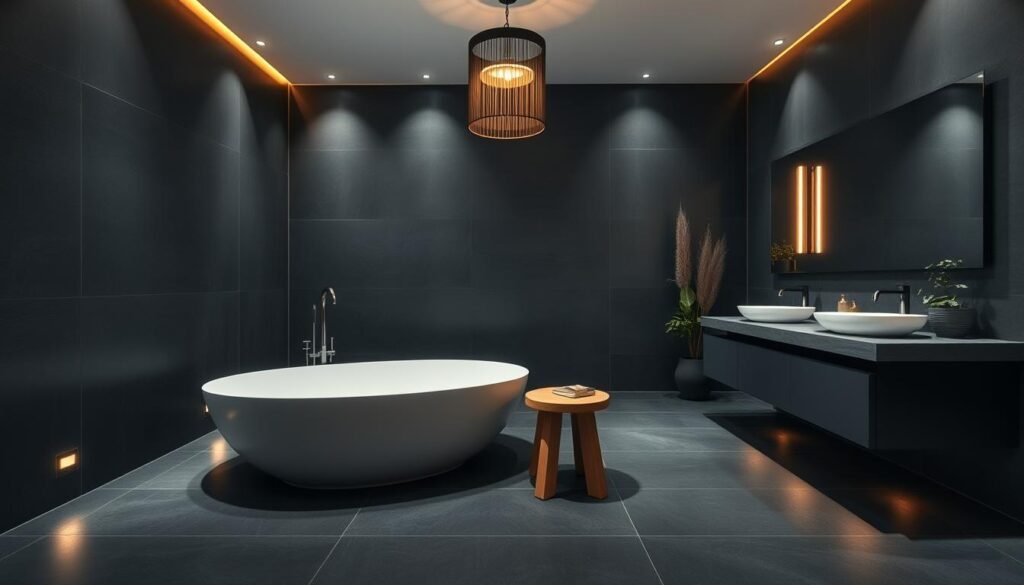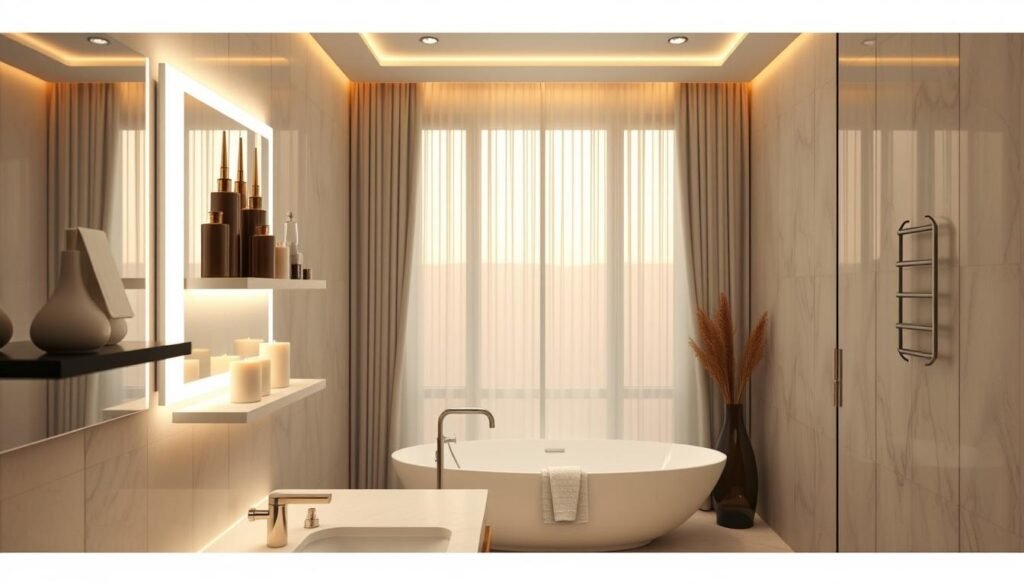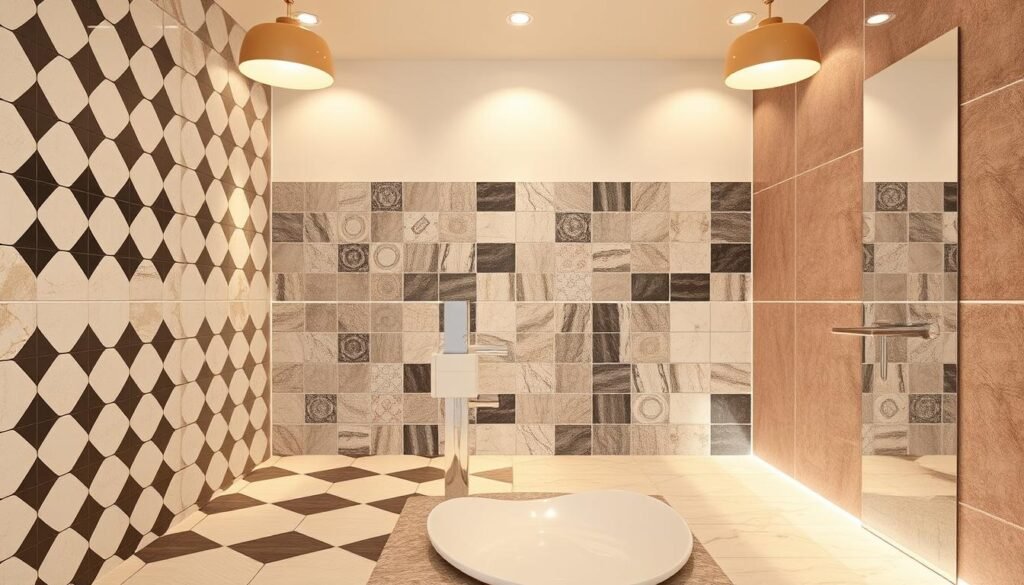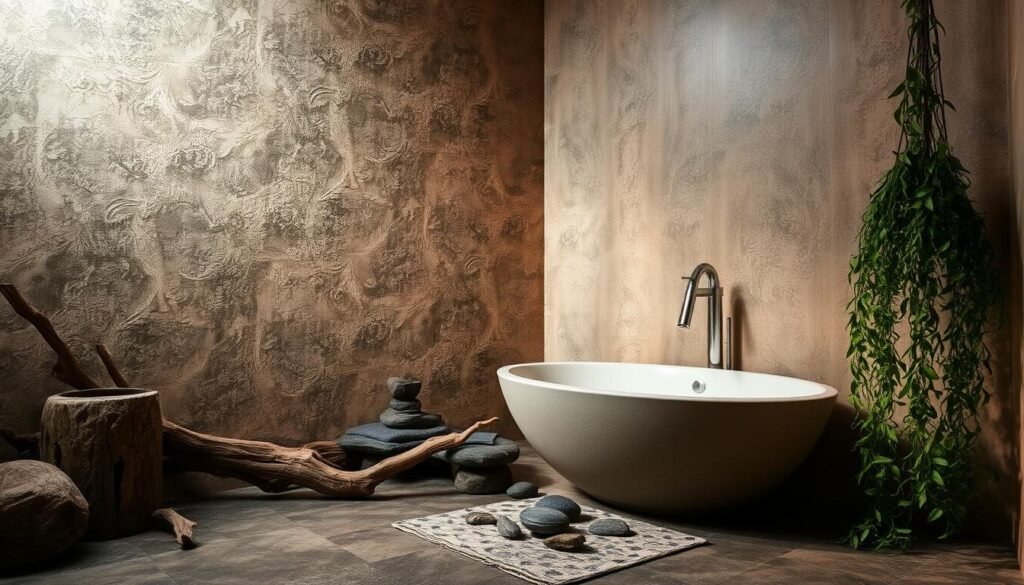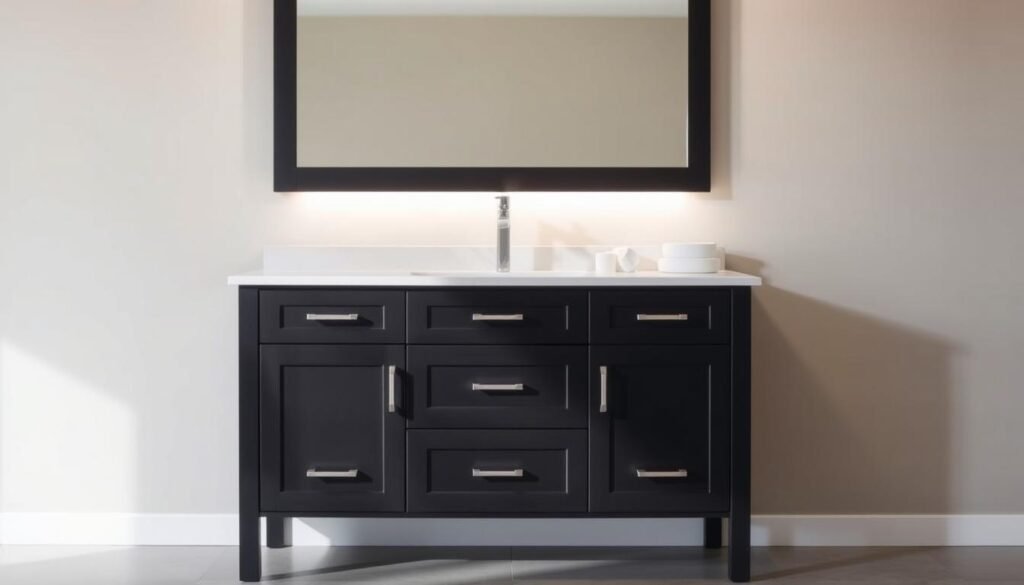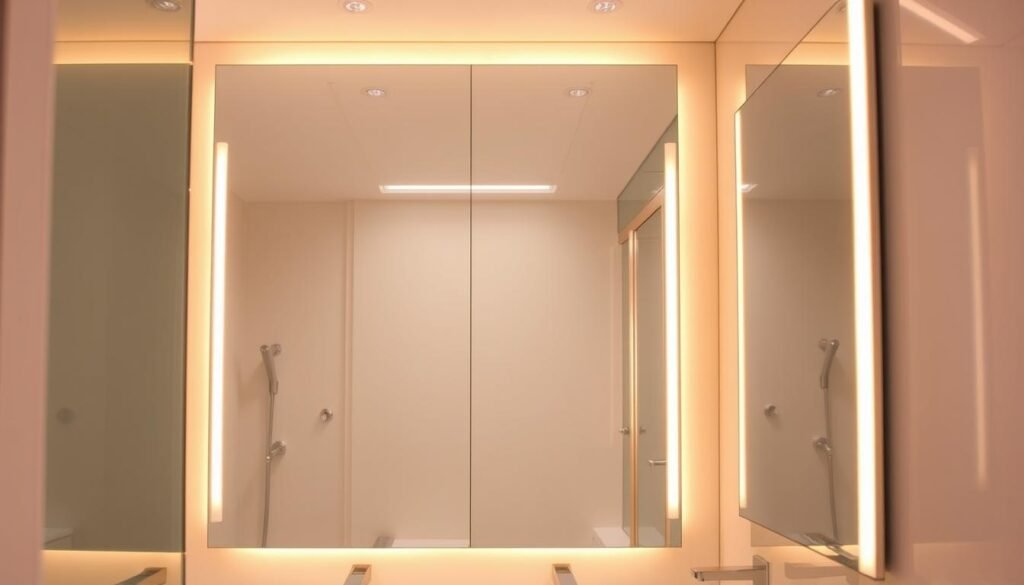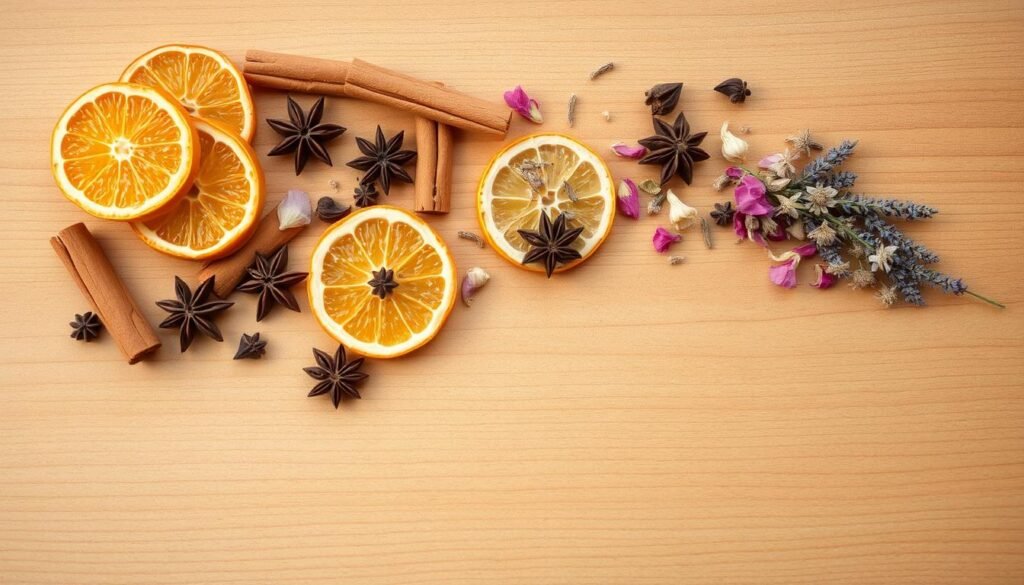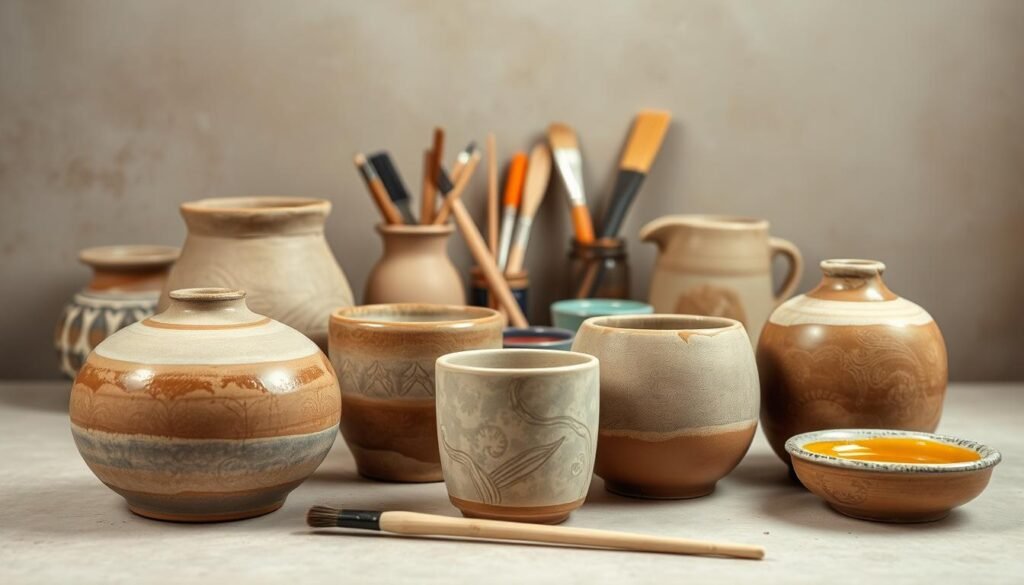Ever scroll through Instagram and wonder how those moody, luxurious spaces became the new design obsession? You’re not alone. Rich, dramatic tones are redefining modern interiors—and your private retreat deserves that same elegant upgrade. Let’s talk about why this trend isn’t just passing eye candy, but a smart design choice that works for any size room.
Think deep hues automatically make a room feel smaller? Think again. When done right, they create a cocoon-like atmosphere that’s equal parts intimate and expansive. The secret lies in balancing contrast—like pairing matte black fixtures with warm metallic accents—to add depth without overwhelming your senses.
We’ll walk through the essentials: lighting strategies that flatter (not flatten), texture pairings that elevate your color palette, and space-enhancing tricks that’ll make your morning routine feel spa-worthy. You’ll discover how to blend practicality with personality—because your sanctuary should reflect you, not just a Pinterest board.
Ready to transform fear of the dark into pure design magic? Grab your virtual hard hat—we’re building a space that’s equal parts moody and magnificent.
Understanding the Allure of a Dark Bathroom
Ever step into a room that instantly wraps you in quiet luxury? Rich, velvety hues do more than catch the eye—they create spaces that whisper “this is your retreat.” Unlike predictable neutrals, deeper tones like midnight blue or charcoal gray bring instant gravitas to your most personal space.
The Power of Shadow Play
Deep jewel tones work magic by absorbing light differently than pale shades. They add dimension, making walls seem to recede rather than crowd. Interior designer Lauren Sullivan notes:
“A well-executed dark palette doesn’t shrink rooms—it gives them soul.”
This effect turns ordinary corners into cozy nooks perfect for unwinding.
Breaking the Beige Barrier
Why do these bold choices feel so revolutionary? They flip the script on traditional design rules. Instead of fighting for brightness, you’re celebrating contrast. Matte black fixtures pop against plum walls, while brass accents glow like embers in twilight.
Your vanity becomes a stage for statement pieces—think artisanal mirrors or handcrafted ceramics. Lighter elements (like marble counters) gain new importance, creating balance without sacrificing drama. It’s not just a room refresh—it’s a design rebellion that pays off in pure visual delight.
Innovative Lighting and Accessory Solutions
Lighting isn’t just functional—it’s transformative. When working with rich color schemes, your fixtures and accessories become collaborators in crafting atmosphere. The right combination turns shadows into allies and surfaces into storytellers.
Accent Lighting Options for Depth and Warmth
Think of your lighting layers as a trio: ambient glow for mood, task beams for practicality, and accent sparks for drama. LED strips tucked under floating vanities create an ethereal lift, while backlit mirrors serve dual purposes—flattering your complexion and amplifying brightness.
Designer Mark D. Sikes advises:
“Treat light sources like jewelry—strategic placement makes all the difference.”
Wall sconces with dimmers let you dial intensity up for makeup sessions or down for candlelit soaks.
Enhancing Mood with Reflective and Metallic Finishes
Metallic touches act like light conductors. Brushed gold faucets catch stray beams, scattering them across matte walls. A hammered copper tray reflects candlelight in fractal patterns, turning ordinary surfaces into kinetic art.
Consider metallic wallpaper with subtle sheen—it adds texture without glare. Pair it with a lean, frameless mirror to multiply reflections. These choices don’t just brighten; they create rhythm, guiding eyes through the space like a choreographed dance.
Contrasting Materials with Bold Tile Patterns
You know that moment when tile choices transform a space from functional to unforgettable? That’s the power of strategic pattern play. Today’s tile innovations let you craft visual narratives through colour and shape—without sacrificing cozy sophistication.
Harmony Through Contrast
Blush pink subway tiles pop against midnight navy walls like lipstick on a tailored suit. This yin-yang approach balances drama with freshness. Designers love pairing matte finishes with glossy accents—think pearlescent mosaics beside rugged stone-look ceramics.
Interior stylist Jessica Barr suggests:
“Treat your shower wall as a gallery wall. Layer three complementary tile colours in varying sizes for organic depth.”
The 50/50 rule works wonders here—use bold patterns in wet zones while keeping other areas airy with lighter tones.
Geometry Meets Personality
Hexagonal floor tiles in alternating black and white create instant movement underfoot. Chevron layouts guide eyes upward, making compact spaces feel intentional rather than cramped. For those craving subtle rebellion? Try contrasting grout that turns grid lines into graphic statements.
Mix oversized cement tiles with delicate fish-scale mosaics for tactile intrigue. This textural tango prevents flatness while letting your walls’ rich hues take center stage. Remember—your floor can ground the design without competing when you choose patterns that echo wall colours in softer tones.
Adding Texture with Wallpaper and Natural Elements
What if your walls could do more than hold up the ceiling? They’re your secret weapon for adding tactile intrigue and warmth to rich colour schemes. The right combination of patterns and organic materials turns flat surfaces into sensory experiences that elevate every square inch.
Choosing Wallpaper to Brighten and Transform Walls
Metallic wallpaper isn’t just for powder rooms—it’s a game-changer in low-light spaces. Designs with subtle gold leafing or pearlescent finishes catch ambient glow, creating movement on walls that might otherwise feel static. Interior designer Emily Henderson notes:
“A bold print in muted tones adds drama without shouting. Think of it as a supporting actor that lets your wall colour shine.”
Textural options like grasscloth or linen-weave vinyl offer depth while resisting moisture. Pair these with jewel-toned walls for contrast that feels curated, not chaotic.
Soften Dark Aesthetics with Light Wood and Accent Pieces
Light wood elements act as visual breathers in intense colour schemes. A walnut vanity grounds the space with organic warmth, while bamboo towel racks add earthy charm. Floating shelves in ash or oak keep essentials accessible without cluttering sightlines.
Introduce natural textures through woven baskets or teak bath mats. These touches absorb light differently than hard surfaces, softening edges and creating cozy layers. The result? A space that feels intentionally balanced—dramatic yet inviting, moody yet warm.
Dark Bathroom: Fresh Paint and Finishing Touches
Your tub and vanity aren’t just fixtures—they’re blank canvases waiting for personality. Modern specialist paints let you reimagine these elements without renovation chaos. Picture a once-plain bathtub reborn in emerald green or a vanity gleaming in deep crimson—these aren’t just updates, they’re design declarations.
Creative Ideas for Painting Baths and Vanities
Ditch the white tub stereotype. High-quality epoxy paints transform standard porcelain into jewel-toned showstoppers. Designer-approved tip? Prep is everything—clean surfaces thoroughly and use moisture-resistant formulas. For vanities, try moody blues like SW Salty Dog. It’s subtle enough to blend with existing schemes but rich enough to command attention.
Integrating Bold Colour Accents for Visual Pop
Colour drenching—painting walls, trim, and ceiling the same shade—creates instant drama in spacious rooms. But smaller spaces thrive with strategic punches:
- Sunflower-yellow towel hooks against charcoal walls
- Lacquered orange stools under a navy vanity
- Matte black fixtures paired with terracotta tiles
These choices prevent rich palettes from feeling heavy. Pro tip: Match painted elements to existing tile or wallpaper patterns. A teal vanity mirroring mosaic details? That’s how you craft a cohesive look that feels intentional, not accidental.
Illuminating Small Spaces with Smart Design
What if your compact sanctuary could feel twice its size? Windowless spaces demand clever light manipulation—not just bulbs and switches. The right combination of tech and texture turns cramped quarters into luminous retreats that breathe.
Strategic LED and Ambient Lighting Techniques
LED strips are your secret weapon. Place them under floating vanities to create a “hovering” effect, or line shower niches for soft glow. Designer Amanda Gates suggests:
“Layer three light temperatures—cool for mornings, warm for evenings—to mimic natural cycles.”
Smart dimmers let you adjust brightness like a DJ mixing tracks. Pair recessed ceiling lights with motion sensors for hands-free convenience. These choices make every square foot work harder while keeping energy bills soft.
Maximizing Reflections with Mirrors and Glass
Glass shower doors do double duty—they contain steam and bounce light like prisms. Try a mirror trio: one full-length, one round above the sink, and a small accent piece. This creates a light relay that fools the eye into seeing depth.
Frosted glass shelves hold toiletries while maintaining airiness. For small bathroom lighting ideas, consider backlit mirrors with adjustable color temps. They reduce shadows during makeup routines while adding futuristic flair.
| Lighting Type | Placement | Space-Enhancing Effect |
|---|---|---|
| LED Strips | Under vanities | Creates floating illusion |
| Backlit Mirrors | Above sinks | Eliminates face shadows |
| Recessed Lights | Ceiling grid | Adds vertical height |
| Glass Tile Accents | Shower walls | Refracts light patterns |
Glass mosaic tiles behind fixtures catch and scatter beams. Pair them with matte black hardware for contrast that says “designed,” not “desperate.” Your morning routine just became a masterclass in spatial psychology.
Combining Industrial Chic and Minimalist Trends
What if raw materials could whisper luxury? Industrial design meets minimalist restraint in spaces where black elements and concrete textures create urban poetry. This fusion isn’t about cold sterility—it’s about celebrating materials while keeping clutter at bay.
Mixing Concrete Finishes with Dark Elements
Concrete countertops become sculptural statements when paired with matte black tiles. Exposed copper pipes? They’re not just functional—they add steampunk flair against sleek surfaces. Designer Kelly Wearstler notes:
“Industrial spaces thrive on contrast. Let concrete’s roughness play against polished fixtures for tension that feels intentional.”
Keep the balance with warm wood accents. A floating ash vanity softens concrete walls, while blackened steel shelves hold linen stacks. This combo prevents the “factory floor” vibe—your space stays inviting, not impersonal.
Minimalist lovers, here’s your playbook: use white marble as a clean canvas. Pair it with black geometric faucets and frameless mirrors. The trick? Let negative space work for you. One bold artwork or sculptural stool does more than a dozen trinkets.
Urban lofts shine with this approach. Highlight architectural bones—like exposed beams or brick—then layer in black fixtures and concrete planters. It’s design alchemy: gritty meets graceful, raw meets refined.
DIY Updates: Mood Boards and Simple Transformations
Transforming your space doesn’t require a sledgehammer or endless contractor meetings. Start with strategic upgrades that deliver designer flair on a DIY timeline. Take inspiration from a recent 8×6 renovation where peel-and-stick wallpaper and fresh paint turned dated beige tiles into a cohesive retreat.
Wallpaper Wizardry Made Simple
Prepping surfaces is 90% of success. Clean walls with TSP solution to remove soap residue. For tricky corners, designer Jennifer Harrison suggests:
“Cut strips 1 inch wider than needed—trim excess after smoothing. This prevents gaps around pipes or light switches.”
Use vinyl options in high-humidity zones. Pair bold prints with neutral vanities to avoid visual overload.
Your Mood Board Roadmap
Digital tools like Canva or Milanote help mix materials before committing. Include:
- Existing tile samples
- Paint swatches (try Farrow & Ball’s Pitch Blue)
- Hardware finishes
This prevents clashes between new elements and permanent fixtures. One homeowner saved $1,200 by realizing her dream marble hex tiles fought with 90’s granite counters during this phase.
| Simple Update | Impact Level | Budget-Friendly? |
|---|---|---|
| Vanity Paint Refresh | High | Under $50 |
| Beadboard Ceiling | Medium | $150-$300 |
| Brushed Nickel Taps | Instant Luxe | $80-$200 |
| Runner Rug | Cozy Factor | $30-$120 |
Notice how metallic accents elevate basic updates? A $20 copper towel rail pairs perfectly with matte black fixtures. These combos create curated looks that feel intentional—not accidental.
Conclusion
Your sanctuary deserves to reflect your boldest vision while keeping comfort within reach. Think of it as curating an art gallery where every element—from marble countertops to geometric tiles—tells your story. The magic lies in balancing drama with functionality: a gold-framed mirror that triples natural light, or hexagonal floor tiles that guide the eye without overwhelming.
Don’t shy away from contrast. Pair matte black fixtures with creamy marble surfaces, or let a single terrazzo wall become your signature moment. These choices create depth while maintaining an airy feel. Remember: strategic lighting transforms even windowless spaces into inviting retreats.
Your final touch? Personal accents. A vintage stool beside the vanity, hand-thrown ceramic soap dishes, or artwork that sparks joy. These details turn trends into timelessness. Ready to reimagine your space? Start small—swap outdated taps, add textured runners, then watch your confidence grow with each design decision.

